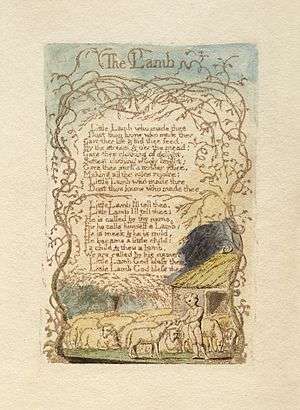The Lamb

"The Lamb" is a poem by William Blake, published in Songs of Innocence in 1789.
The Lamb
Little lamb, who made thee
Dost thou know who made thee,
Gave thee life, and bid thee feed
By the stream and o’er the mead;
Gave thee clothing of delight,
Softest clothing, woolly, bright;
Gave thee such a tender voice,
Making all the vales rejoice?
Little lamb, who made thee?
Dost thou know who made thee?
Little lamb, I’ll tell thee;
Little lamb, I’ll tell thee:
He is callèd by thy name,
For He calls Himself a Lamb.
He is meek, and He is mild,
He became a little child.
I a child, and thou a lamb,
We are callèd by His name.
Little lamb, God bless thee!
Little lamb, God bless thee!
− William Blake, 1789
![]()
"The Lamb" is the counterpart poem to Blake's poem: "The Tyger" in Songs of Experience. Blake wrote Songs of Innocence as a contrary to the Songs of Experience – a central tenet in his philosophy and a central theme in his work.[1] Like many of Blake's works, the poem is about Christianity. The lamb is a common metaphor for Jesus Christ, who is also called "The Lamb of God" in John 1:29.
This poem has a simple rhyme scheme : AA BB CC DD AA AA EF GG FE AA. The layout is set up by two stanzas with the refrain: "Little Lamb who made thee/Dost thou know who made thee". In the first stanza, the speaker asks the lamb who his creator is; the answer lies at the end of the poem. Here we find a physical description of the lamb, seen as a pure and gentle creature. In the second stanza, the lamb is compared with the infant Jesus, as well as between the lamb and the speaker's soul. In the last two lines the speaker identifies the creator: God.
Like the other Songs of Innocence and Songs of Experience, The Lamb was intended to be sung; William Blake's original melody is now lost. It was made into a song by Vaughan Williams, in his 1958 song cycle Ten Blake Songs, although he described it as "that horrible little lamb - a poem that I hate".[2] It was also set to music by Sir John Tavener, who explained, "The Lamb came to me fully grown and was written in an afternoon and dedicated to my nephew Simon for his 3rd birthday." American poet Allen Ginsberg set the poem to music, along with several other of Blake's poems, in the 1970s.[3]
Gallery
 Songs of Innocence copy B 1789 Library of Congress object 29 "The Lamb"
Songs of Innocence copy B 1789 Library of Congress object 29 "The Lamb" Songs of Innocence, copy G, 1789 (Yale Center for British Art) object 8 "The Lamb"
Songs of Innocence, copy G, 1789 (Yale Center for British Art) object 8 "The Lamb" Songs of Innocence copy U 1789 The Houghton Library object 11 "The Lamb"
Songs of Innocence copy U 1789 The Houghton Library object 11 "The Lamb"%2C_object_8_The_Lamb.jpg) Songs of Innocence and of Experience, copy A, 1795 (British Museum), object 8 "The Lamb"
Songs of Innocence and of Experience, copy A, 1795 (British Museum), object 8 "The Lamb"%2C_object_8_The_Lamb.jpg) Songs of Innocence and of Experience, copy C, 1789, 1794 (Library of Congress), object 8 "The Lamb"
Songs of Innocence and of Experience, copy C, 1789, 1794 (Library of Congress), object 8 "The Lamb"%2C_object_8_(The_Lamb).jpg) Songs of Innocence and of Experience, copy Y, 1825 (Metropolitan Museum of Art), object 8 "The Lamb"
Songs of Innocence and of Experience, copy Y, 1825 (Metropolitan Museum of Art), object 8 "The Lamb" Songs of Innocence and of Experience, copy Z, 1826 (Library of Congress) object 8 "The Lamb"
Songs of Innocence and of Experience, copy Z, 1826 (Library of Congress) object 8 "The Lamb"%2C_object_8_The_Lamb.jpg) Songs of Innocence and of Experience, copy AA, 1826 (The Fitzwilliam Museum), object 8 "The Lamb"
Songs of Innocence and of Experience, copy AA, 1826 (The Fitzwilliam Museum), object 8 "The Lamb"
References
- ↑ Kazin, Alfred. "Introduction". The Portable Blake. The Viking Portable Library. 41-43
- ↑ Hold, Trevor (2005). Parry to Finzi: Twenty English Song-Composers. Boydell Press. p. 122. ISBN 9781843831747.
- ↑ "Songs of Innocence and Experience by William Blake, tuned by Allen Ginsberg"
External links
| Wikimedia Commons has media related to Songs of Innocence - The Lamb. |
- A Comparison of different extant versions Blake's Illustrated and Hand Painted version of "The Lamb" at the William Blake Archive
- A Bibliography of Important Interpretations of "The Lamb from the University of Georgia English Department.
| Wikisource has original text related to this article: |